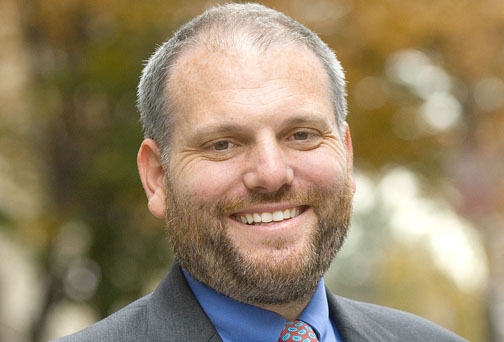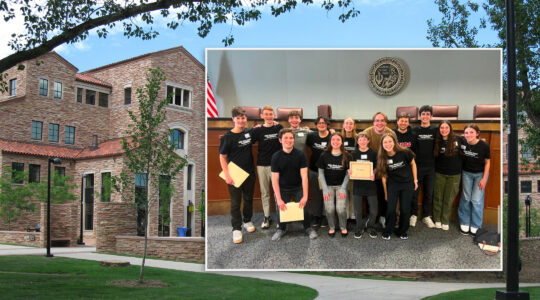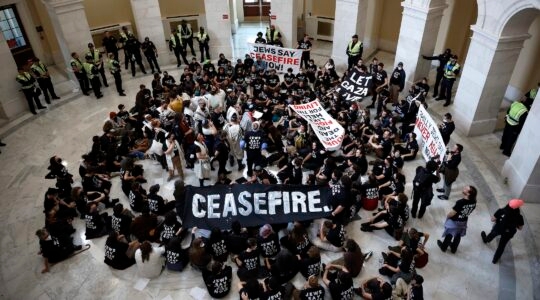NEW YORK (JTA) — After offering strong support for President Obama’s spending proposals, Jewish organizations are raising major objections to a tax provision in the administration’s budget plan that they say would lead to a sharp drop in charitable donations.
Officials at the United Jewish Communities and the Jewish Council for Public Affairs, as well as the Orthodox Union and the American Jewish Committee, are opposing a provision in the budget that the Obama administration says would be used to help create a $634 billion reserve fund to pay for health-care reforms.
Set to take effect in 2011, the provision would reduce the charitable tax deduction for households earning $250,000 in gross income annually. Under the current system, those in the 35 percent tax bracket receive a 35 percent deduction on charitable contributions. Under Obama’s proposal, the deduction would be reduced to 28 percent.
The reduction comes on top of general proposals for raising the marginal tax rates on the wealthiest Americans.
“We are generally supportive of health-care reform and working with the administration toward this goal, but I don’t see it as my job to find the money for this,” said William Daroff, UJC’s vice president for public policy and the director of its Washington office, which lobbies for hundreds of millions of dollars annually in federal money for social services.
“It is my job to say this is the wrong place to get it because you are hurting those you are attempting to help — average folks in need of the services of charities. Beyond that there are over 15 million people who work for nonprofits, and any decrease in contributions will exacerbate the tough times that many charities are already going through. In fact, many charities, and many federations, are already laying off people.”
UJC, the national arm of the network of local Jewish charitable federations, and JCPA, an umbrella group bringing together national groups and local communities, were among the many Jewish organizations that came out in support of the stimulus bill. And many groups back the push by the Obama administration for a boost in social service spending and reforms to the health-care system.
Daroff says he’s been hearing concerns about the tax provision, and about a half-dozen Jewish organizations are looking to the UJC to take the lead in fighting it. He floated a few alternatives to pay for Obama’s programs — a higher tax on cigarettes, a tax on employee health-care benefits or a raise in marginal taxes — but said ultimately it’s up to the president to find an alternative.
Even organizations like the AJC, generally associated with foreign policy and church-state issues, are feeling the need to speak out. Executive Director David Harris wrote an open letter to Obama administration budget czar Peter Orszag estimating that the provision could cause a 20 percent decrease in giving among the $250,000-and-up set.
“As most nonprofits derive 70 to 80 percent of their donations from a small proportion of donors who are major givers, this proposal will deal a destructive blow to many charities,” Harris wrote.
Similarly, the OU expressed “grave concern” over the tax provision and threatened to fight it in Congress unless it is immediately removed from the budget proposal.
While such concerns are widespread among nonprofits, Jewish and non-Jewish, some observers see them as an overreaction.
The Center on Philanthropy at Indiana University acknowledged that the reduced deduction would “increase the challenges nonprofits have,” but said it would only have a moderate impact.
If the proposal had been implemented in 2006, the Indiana center estimated that the change would have caused a 2.1 percent drop in itemized giving by households with income of $250,000 and above. The far greater concern, according to center officials, is the decline in personal wealth and the economic crisis. All three factors combined would have resulted in a 4.8 percent drop in charity in 2006.
The estimates, however, have not allayed Daroff’s concerns.
The UJC and the Jewish federation system it represents rakes in roughly $2.5 billion per year through its general campaigns and endowments. By Daroff’s estimate, even if Indiana is accurate, the so-called modest cuts would cost the UJC $50 million per year.
“That is a heck of a lot of funds for Jewish Family Services across the country,” he said. “Maybe $50 million is not a lot of money to the endowment of the University of Indiana, but for the Jewish Family Services across the country that depend on donations, that is real money. Do the math: One or 4 or 8 percent doesn’t sound like a lot of money, but do the math and that is real green money that is lost.”
Diana Aviv, Daroff’s predecessor at the UJC before becoming the executive director of the Independent Sector, a philanthropy leadership forum that has more than 600 member organizations, offered a different take.
“I think there are arguments on both sides of this page that are important,” she said, “and we need to weigh both sides of the arguments.”
Independent Sector issued a statement saying that the tax provision “could be a disincentive to some donors,” but it has not formally adopted a stance, Aviv said.
For some backers of the provision, it is not only a matter of raising more revenue but also of equity among taxpayers. Those making less than $100,000 per year who donate $1,000 now receive a $150 tax break, compared to those making $1 million per year who receive a $330 tax break. The proposed rule would close the gap, lowering the deduction for wealthier Americans to approximately $230.
Aviv noted that some believe the tax provison could end up helping nonprofits.
For starters, since the change would not take place until 2011, there could be a short-term spike in giving as donors try to get in their gifts before the provision takes effect. In addition, the provision is being presented as a way to help fund changes to a more universal health-care plan — a step that eventually could create major savings for charities.
“That is the argument,” she said. “But it is cold comfort for some in 2011.”
JTA has documented Jewish history in real-time for over a century. Keep our journalism strong by joining us in supporting independent, award-winning reporting.






